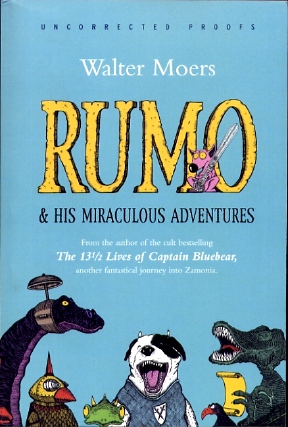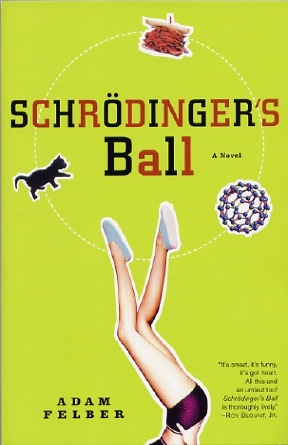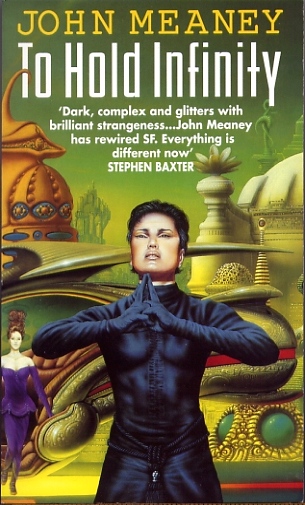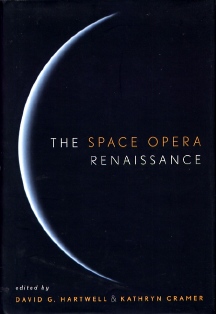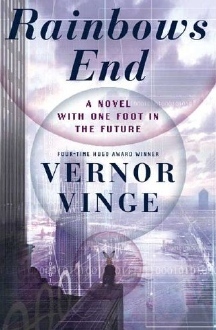|
|
|
This Just In...News from the Agony Column
|
08-04-06: Walter Moers Unleashes 'Rumo and His Miraculous Adventures' |
|||
Why
Some Things Work
Yes, I get a lot of books for Young Adults, having at some time or another been noticed for actually writing about one or two I liked. But for every one I've liked, there have been many I have bounced off of with an audible-to-me-only "Yikes!" It doesn't take me long to determine if I'm going to like a book or not, and unless someone is coughing up cold hard cash, and lots of it, for me to read and review a specific book even if I think it should be buried in the backyard with the anonymous animal corpse we found rotting beneath our porch some months ago, I give these books a pass. I happen to love reading, and one of the reasons I love reading is that I've gotten rather good at finding books I like. I read those books and send the rest through. I even actually send through more than a few I think I would like, but not enough to read. There are lots of good books to read out there if you’re willing to stray beyond one particular category. If you only read say, Hard SF, or splatterpunk horror, or girly mysteries, or literary masterpieces, well, the pickings can get slim. If you’re willing to read simply good books, then you've got some room to move about. All this preamble is just my way of working round to my quite justifiable hesitation to even open up Walter Moers' 'Rumo & His Miraculous Adventures' (Overlook / Spetember 18, 2006 ; $25.95). As I say, I'm willing to read YA fiction, but not all that willing. I've got piles of well-reviewed "Bestselling!" YA series books that I couldn’t get past page one in. They looked to have interesting plots, detailed worlds, complicated, nicely-drawn maps of these imaginary worlds, and all the rest of what generally interests me. But the writing at the sentence and character level didn't cut it. They didn't seem to be worth reading or worth writing about. I've only got so much time, and by virtue of my insomnia, I actually have more time than most. But I can't be bothered to try and read a book that pretty much says to me on page one: bad prose, overblown heroes, cliché characters, predictable plotting, let alone write about such works. That's time I'm not going waste, either yours or mine. Yet, here I was once again faced at 3:30 AM with another YA book, and this one didn't look promising. Well, I did enjoy the first Moers' novel I encountered, 'The 13 1/2 Lives of Captain Bluebear', and not just because our pug's favorite lovey is in fact a blue bear. No, I liked the sort of Stanslaw Lem style weirdness, the good writing, the really oddball plotting, the clanging against cliché that transpired on every page. But this 'Rumo' book appeared to be a whole different deal. It involved a cute doggie-like critter. This is not an easy sell, especially to one who has an actual cute doggie that sleeps in a basket next to me whilst I do this sort-of pretend work. Add to that the fact that it is translated, and happy times were not likely to be ahead. But I'm generally fearless enough to read the first few pages of almost any stinker-to-be that at least looks as if it were published by professionals. I could give 'Rumo' [etc] long enough to poop on my parade, then send him off to a silent finish in deep in the stacks and thence eventually to the local library where he could inflict his cutesy-goodness on some unsuspecting child, a child who might someday in the far, far future realize that he was lucky to have parents who took him to the library. Alas, those first few pages were not dreadfully bad. I would not get to write about the book with the gal spread-eagled in red, the potential victim of some That Book-inspired murder plot. Not me, not today. Nope, this damn 'Rumo' book proved to be pretty damn good where it counts. On the sentence-by-sentence-yes-I-actually -read-the-goddamned-books level. I sometimes wonder if the folks who positively review these "Bestsellers!" actually read them on that level, or whether they read them with the idea that they’re going to be adapted to a movie in mind. But those folks are highly paid – or at least, paid something, and the books are, after all, "Bestsellers!" My pay is irrelevant, and 'Rumo' [etc] may never even have the chance to look upward and see the detritus falling off the bottom of the bestseller list. But the lucky folks who manage to get past all their issues with cute dogs, translated books and YA fiction will themselves on the receiving end of the damn fine sentence-by-sentence, character-and-plot-development writing. 'Rumo' [etc] does not expect to get by on a clever core concept and big-ass marketing campaign. Nope, 'Rumo & His Miraculous Adventures' is, when you come down to it, simply a well-written book. Moers' prose is intelligent and he takes his readers seriously. His writing is engaging with a nicely nuanced ironic distance, while his world of Zamonia is appropriately weird. In all my blathering, I've neglected to give you the standard-issue plot summary. I'll eschew that this time round, and simply mention that Rumo is a Wolperting, a doggie-like critter in a world populated by things stranger, stronger and weirder. He has some adventures, which are by and large quite entertaining and certainly compelling reading. Overlook makes some pretty darn nice books, and this one comes with some excellent illustrations by Moers himself, enough that I wish there were more. But then at 688 pages, there's probably enough Rumo to go around. I'm really curious to see where Moers goes next, and a lot more willing to go with him. |
|
08-03-06: 'Year's Best Fantasy 6' Edited by David G. Hartwell and Kathryn Cramer |
|||
In
Case You Think Anything in the Publishing World Makes Sense
Shove all that aside for a moment; let's talk about the content. It includes material from McSweeney's, F&SF, and even 'Inside Job' by Connie Willis, published as a standalone novella by Subterranean Press. You get a pretty terse, two-age intro that offers the by-now-expected "we used a wide definition of fantasy" explanation for the kitchen-sink content. And I'm all for a kitchen-sink style collection. What surprises me is the breadth of material that they've crammed into a mere 354 pages. With 23 stories, this collection is eminently readable, perfect nightstand material. For me the sheer length of other "Year's Best" anthologies makes them a bit daunting to pick up. Standouts here include the opening tale, "Eating Hearts" by Yoon Ha Lee, and "Read it in the Headlines" by Garth Nix. I love these kind of easy-reading metafictional stories. They're definitely a hoot. But I'm not going to give you a blow-by-blow description of each story. Instead, I want to try to convey the sensibility behind the selection and suggest what kind of reader might actually read this book. As to the former, I'd suggest this book wants to paint a picture of fantasy that I hold close to my heart, the BIG pitcher. Fantasy as selected by Hartwell and Cramer is a non-genre of literary invention, a Big Tent that finds literary fiction nestling up to work by folks who generally get their books shelved in Da SF Ghetto. That said, a heaping helping hail from F&SF. In fact, it's the only magazine that gets mentioned on the less-than-helpful colophon page. So if you subscribed to F&SF in 2005, chances are you've read a few of these. Others slip in from the McSweeney's gig, and others from Polyphony, Realms of Fantasy and then on down the ladder. The trend here is literary fiction from the genre and genre fiction from literature; solid borderlands material that will appeal a fairly wide readership, so long as said readers are not put off by elements of the fantastic or (even skeerier) elements of literary style. And as to the "which readers will enjoy this book" question? Well, of course, series-collecting completists will be jumping up and down for joy at the TPB format the Tachyon publication. (Though the print is a bit small; that's probably part of how they get it all in 354 pages!) This is a sturdy, gorgeous volume with a great cover illustration. So collectors and completists, rejoice. This Tachyon book is a sweet deal in all respects. To my mind, the best audience for this is that portion of the litrary readership that is willing to experiment. I think that say, the entire subscriber and reader base for McSweeney's should run, not walk and pick this one up. It will "blow your minds" with both the quality of the material offered and the fantastic textures to be found. I think the earth might move for you. This is literature of the highest quality, finely selected, keenly introduced and edited, and published with care. It's a great collection with a lot of variety that is quite likely to introduce you to writers whose work you'll enjoy, and for me at least, that's one of the primary reasons to read a "Year's Best". Of course, the genre fiction community at large should embrace this one, but how you divvy up your dollars, pounds or whatever currency you might be spending is open to debate. The Datlow version of this is likely to have a similar sensibility but not a similar portability. So it all comes down to the age-old question of, "Does size matter?" If so and if you like your anthologies slim, tight and compact, then here's a winner. If size does not matter to you, then you might want to wait for the Datlow version to do a compare and contrast. If there's not much overlap, buy both. And probably, you'll end up with both. I can personally suggest a regime that combines insomnia with speed-reading that might give you the time to read both. How that might work for you, well, only you'll know. I think this is a fine collection, and it's a great move for Tachyon. Yes, it's really absurd that two top editors offer an anthology of SF (which we're told does not sell well) that ends up in hardcover from a New York publisher and an anthology of fantasy (which we're told does sell well) that ends up as a trade paperback from a west-coast publisher. But it's fantasy, the literature of the absurd, even, it seems, when it comes to marketing and sales decisions. Perhaps the folks who live in skyscrapers write about elves and trolls at night because they have marketing meetings with them during the day. |
|
08-02-06: Adam Felber Rolls 'Schroedinger's Ball' |
|||
Science
Fiction Versus Rube Goldberg
Instead, expect a series of riffs, a procession of vignettes, a madhouse march of oddly observed events that against all odds add up to a novel. Felber's concocted a counter-factual reality from cutting-room floor scraps, thrown those scraps in a bag with a randomly selected pages from tomes on quantum physics and then managed to wad all of this together for a fraction of a fraction of a second, just long enough for it to become a novel. He held this proto-novel together long enough for it to achieve its own gravitic pull, then popped his hands apart and started picking up sheets of paper. And damn, if that didn't work just fine, resulting in the weirdest science fiction work this side of the Usual SF Comedy Suspects. But let me tell readers here and now that 'Schroedinger's Ball', while very science fiction, is also very much This Side of the Usual SF Comedy Suspects. It's genre fiction, but it doesn't exactly read as genre science fiction. It just reads like lightning, like "1001 SF Jokes for Toilet Reading" that happen to, as an afterthought, form a novel. And that's the real beauty here. Felber's a funny guy, but he's also a smart, smart guy, smart enough to know he's not a scientist, and smart enough to present himself as not being smarter than his readers. He's also smart enough to present this story in a series of rather daringly experimental comedic styles that have the net effect of making this novel eminently, addictively readable. Like the best comic novelists and writers, Felber knows that it is all a matter of timing and his sense of timing is impeccable. Jokes arrive at the correct moment and never overstay their welcome. Riffs–from a binary system crash of the novel itself to a World War Two newsreel screenplay–are perfectly observed and not overused. As for the science in this fiction, and there's plenty of it, it's really pretty spot-on and utterly upside-down. To wit: Felber is not trying to do a good job at conveying the notions of quantum physics. He's trying to do a bad job, and he makes such a magnificent mess out of everything that he comes right round the other side and makes far more sense than an entire standee's worth of sober, serious and studied writers speculating on the potential for space travel provided by the sharper image of ionic breezes. Or at least he never once threatens to bore the reader shitless, and there's a virtue that is never out of style. Felber's novel is wall-to-wall fun, with cleverly disguised big thinks blinking across the vacuum tube of the reader's mind. Plus, it’s never annoying. It's my take that the audience for books that combine comedy and quantum physics and experimental prose is probably fairly small at best. That audience will be well served by this novel. I think that the science fiction world should embrace this book. Or at least let it stand over by the door. I was really torn when I first encountered this. I want to like it, I thought, but, oh my. Actually reading the text cured my oh my as well as making me laugh. And the strong, weird science fiction aspect won me over. You think you know what science fiction is, or at least that you'll know it when you see it? This book will test your porn-honed instincts. It's weird even by the so-called generous standards of science fiction. You may now begin throwing your food at me. |
|
08-01-06: John Meaney Wants 'To Hold Infinity' |
|||
A
Long Time Coming
I wasn't the only fan of Meaney's work by any means and we can thank Lou Anders over at Pyr for the brand-new and shiny hardcover of Meaney's first novel. And we can thank him again when we enjoy the original cover art by the always-excellent Jim Burns, now on a large dust jacket instead of confined to the covers of a mass-market paperback. But for whom is this book especially good news? Those who have not yet read Meaney. 'To Hold Infinity' is an example of why my default setting for reading an author is chronological, in the order books were published. If you've not yet read Meaney, here’s a great futuristic detective story set on a world at the cusp of that ol' Singularity. The setup here is pretty simple. We've got a nice Space Opera backdrop, you know, humanity spread across inhabited planets, able to go hither and yon with the help of "mu-space" tech and some fairly mysterious Pilots. Yoshiko journeys to Fulgar to re-connect with her estranged son, Tetsuo. But Testsuo is in trouble, because his facility with mu-space tech is being funneled into some illegal IA. Yoshiko arrives to find him missing and accused of murder, a crime she's got to solve in order to facilitate his return. But the real killer proves to be more adept than one could reasonably expect. Oh, did I pass right over IA? Those who tuned in to the Vernor Vinge/Cory Doctorow NPR article or the subsequent interviews with Vernor Vinge (Part 1, Part 2) might have picked up the term. It's Vinge's clever turn-of-the-phrase for Intelligence Amplification, and Meaney's development of this concept in this novel is simply superb. Meaney creates one of the all-time greatest nefarious, sympathetic murderers you'll ever read about. He also hones in on the precise point of the Technological Singularity, portraying a society where the separation between classes is being engineered into a separation between species. This is a particularly frightening concept, and Meaney mines it excellently, creating a page-turning mystery and a mind-bending work of speculative fiction. But this is not all that Meaney accomplishes with 'To Hold Infinity'. His prose is not simply dense and descriptive, putting the reader into a series of surreal visions that play off our own peculiarly split-level lifestyle of mind-boggling riches and death-defying poverty. He's created a sort of spin-off of computer code for internal communications that is totally entertaining and really right-on. Anyone who has ever taken more than a casual glance at actual computer code will find something familiar and fun in Meaney's creation. And if you've never seen computer code and don’t care to, the net effect will be incredibly convincing, and still eminently readable. So, the deal is you've never read Meaney and now you read this one and trust me you’re quite prepared to read his Nulaperion Sequence, 'Paradox', 'Context' and 'Resolution'. And one of the reasons why is that 'To Hold Infinity' is, I believe something of a prequel to those novels. You'll find hints of 'To Hold Infinity' in all the subsequent titles, and, if you've already read them, then you'll find 'To Hold Infinity' has all the appeal of the insider prequel. And heck, really, at this point, who cares? It's a newly published in hardcover novel by John Meaney, and at the end of the day, that's the only criteria you need to put it on your buy list. |
|
07-31-06: Hartwell & Cramer Curate 'The Space Opera Renaissance' ; Vernor Vinge Informs Us That 'Rainbows End' |
|||
Anthologies as Literary Museums
Forget the stuck-in-a-single-place museums that, though they serve their purpose, are by their very nature exclusionary. 'The Space Opera Renaissance' ( Tor Books / Tom Doherty Associates ; July 11, 2006 ; $39.95) welcomes anyone who can heft a book. Given the heft of this particular volume, both fiscally and size-wise, that's a limiting factor as well, but no sort of stopper. For anyone who reads and enjoys science fiction, and for those who think it might be possible for them to do so, for those who have derived a few brief moments of pleasure from the endless media mutilations of the genre, 'The Space Opera Renaissance' is the be-all and end-all of beginnings, of literary museums. This collection is a must-buy book that competes at an entirely different level with an entirely different media. Here’s the book, the literary anthology that works perfectly as a museum, carefully curated by true artists who know their shit from shinola and make no bones about separating the two. Here's a book that by virtue of the care with which it is assembled transcends its own being as a book and becomes something more, a cultural artifact, and yes, a museum. 'The Space Opera Renaissance' is not a museum of the musty sort, or of the self-promoting sort. It's an all-words example of the best words, in this case, the best words about a rather particular portion of science fiction called space opera. I've had my own say about space opera, back in the day. So I'll not treat the subject of the work, but rather this particular work itself. For a pricey but fair forty bucks, you get 941 pages of the best of this particular sub-genre, carefully chosen and chock-full of insightful but not long-winded commentary. "How Shit Became Shinola: Definition and Re-Definition of Space Opera" is the kind of non-fiction that not just science fiction needs, but literature needs. Cramer and Hartwell write a seamless, fascinating and relatively terse look at the history of space opera, the perfect hallway intro before you enter the wings of their extensive museum. And really, when you consider the door-stop nature of so many space opera novels and series these days, their accomplishment here manages the rather astonishing feat of being larger than the book itself. Let's be fair about this, though. Everybody, but everybody is going to have a few favorites left out of such an endeavor. I can name–well, I'm going to go past that, because this article is about what's in this book, not what I wish would be in it. And what this books is, when you back off a bit and take a slightly longer view, is a genre-defining anthology of a genre that has been diluted, polluted and disputed into complete turgidity by an onslaught of media-made crapola that would make that ice-cream-cone-like doomsday machine from one of my favorite episodes of Star Trek puke like it never puked before. The service that Hartwell and Cramer perform here is not just to SF fans, who will probably (and with some reason) carp about what's in or not in the book. The service here is to erect a credible, well-wrought and sturdy book-as-museum that those who do not know all the nooks and crannies can check out of their local library and browse through to get familiar with the genre. So, for a brief bit as to the structure of the book. You get the opening essay, probably to be nominated for some sort of award or another. You get six sections of selections, progressing in a roughly chronological order. You get, and this is important, an introductory essay to each selection, a brief bio of the author with lots of critical insight as to the work itself. It's just like a museum, with the exhibit being a selected work of science fiction that authors have curated into their collection. And this is science-fictiony science fiction, of the type that parents warn their children against reading, the type that literary critics are happy to throw in a slop bucket with half-dozen steaming pieces of manufactured media manure. "The authors of Fancyclopedia," Hartwell and Cramer write, "are laughing. But we are not. There are more of them than there are of us." If anything could move the mountains of excrement back to reveal the literary gold underneath, it is this collection. If anything can. I'm not holding my breath. For every nugget of literary space opera gold, and there are plenty of them out there these days, there are two buckets of a substance so objectionable that even fans of literary space opera might have a hard time coming up with a descriptive term. For all that we want to see science fiction as some huge and inclusive Big Tent, when you come right down to it, the words "science fiction" generally evoke in the mind of those who hear them, a picture out of some space opera with all the pluses and minuses, all the baggage that such visions evoke. To have Hartwell and Cramer bring that particular picture into such clarity of focus, such genial reading, is a service to readers of all tastes that cannot be underestimated. There are very few humans who are totally, utterly immune to the drool-n-slurp attractions of media-SFX-"SCIFI". Even those who truly disparage such work find iut pretty difficult to immediately avert their eyes. Oh, the eyes will get averted and fast, but the attraction remains. Hartwell and Cramer here excavate the totally SFX-less literary reasons for this attraction. Space Opera is indeed a form of literature. No, it's not all 'Heart of Darkness' in the darkness of space, nor does it need to be. What it is, is a vibrant and very flexible set of idioms and ideas that can be explored by talented writers with felicitous results for all concerned. One hopes, one prays that readers from outside the genre will stumble across this book and get an entirely new, clean and literary take on Space Opera. As for the museum aspect of this book; well, it's for the ages, as occasionally anthologies are. Hartwell and Cramer are themselves responsible for erecting a number of these genre-oriented edifices. 'The Dark Descent' holds a high place in my library. But there are others as well; 'Mirrorshades: The Cyberpunk Anthology' edited by Bruce Sterling, and Kirby McCauley's 'Dark Forces'. These are the museums that matter to readers. These are the museums that admit anyone, anytime, anywhere. These are the museums that we can read. |
|||
A 2006 Conversation With Vernor Vinge, Part 2
|
